Main Story
Dele Alake- A spin Doctor in Deep Murky Solid Minerals Swamps
Published
2 years agoon
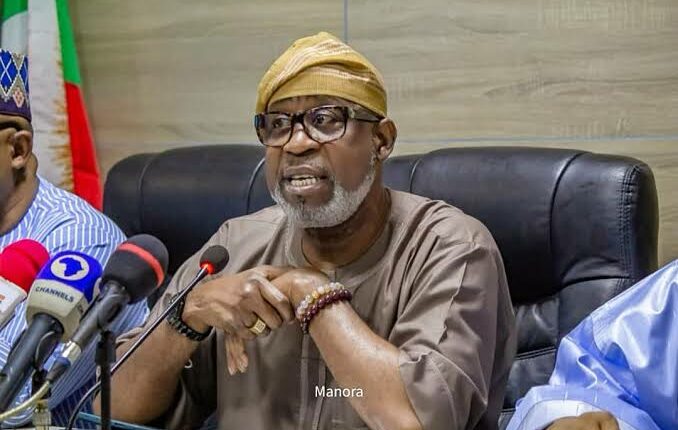
Oladele Alake, a consummate journalist, cerebral, shrewd administrator, robust analyst, is suddenly thrown into the deep abyss of the Solid Minerals management by the President, Asiwaju Bola Ahmed Tinubu who has deployed him to the Solid Minerals Ministry.
Alake might be a versatile administrator, but his new duty post may stretch his cognitive capabilities beyond limits. In this national assignment, he is going to confront a deadly gang of solid mineral jackals, more deadlier than the Crude oil thieves.
In his new assignment, the veteran editor is clearly in a no man’s land. He is going to be evaluated at the end of the Tinubu’s presidency solely on his performance here, and no recourse to any past exploits. But most unfortunately, he may not find a news editor, or a sub editor to guide the gate for him, but, mostly, some ravenous civil servants, who most probably are in cahoots with the mining gangsters. Yet, he has to navigate this uncertain territory, all laced with all the banana’s peels and deadly mines.
The man Alake himself seems to fully aware of the challenges ahead in the new forte. But he claimed to have deliberately chosen to confront the challenges bugging down the minerals sector of the nation’s economy.
Speaking inside the Presidential Villa shortly after being sworn in, Alake claimed that he chose to vie off from information and communication area to pursue his passion for solid mineral.
“Of course, I’m very prepared. It is funny really because all over the world and especially here in Nigeria, those who have been following the historical development, particularly the Asiwaju Bola Ahmed Tinubu political system, would conclude that I will be in the Information Ministry, as if I’ve been pigeon-holed into the information system. Of course, you don’t blame them because of the antecedents that are known.
Nigeria, either in the arid region of the North East, the savannah belt of the North West, or the lustrous green forests of the North Central have an undeterminable volume of deep solid minerals lying in the bowels of her soil. And when you go down the delta region of the South South, or the South East, then navigating to the South West, the huge deposits stark a curious geo-physics engineer in the face. The country is simply blessed with untold quantity of solid minerals, and in virtually all regions, all states.
But the lacuna between the riches that come with such deposits and the country economy health lies in the activities of the vicious, unscrupulous, wild jackals, the baron miners, mostly illegal. And these filthily rich jackals are the people, Dele Alake, a journalist has been thrown into ring to square up with.
While the country wallows in deep pit of external debt, the illegal and their enablers, miners smiles to the banks, with huge dollars deposits regularly.
The mining sector of the economy have never been recorded to contribute much to the nation’s economy despite its huge potentials. Not that the ministry has been bereft of capable administrator, at least, the widely acknowledged cerebral Dr. Kayode Fayemi, once superintended the Ministry. He did not achieve much before he dumped the Ministry to pursued his governorship ambition in Ekiti State in 2018.
Like many jurisdictions, such as the UAE and Australia, the mining industry in Nigeria is regulated by the Federal Government. The government ministry tasked with this responsibility is the Ministry of Mines and Steel Development, now renamed Ministry of Solid Minerals.
To protect its resources and regulate all aspects of exploration and exploitation of solid minerals in the country, the Nigerian government re-enacted the Nigerian Mineral and Mining Act in 2007. This Act vested ownership and control of all lands where minerals are found in commercial quantities in the Federal Government, thereby prohibiting unauthorised persons from exploring and exploiting these mineral resources.
The Federal Government grants the right to explore and exploit minerals in Nigeria by issuing various mineral titles. Thus, a mining company wishing to mine lithium or any solid mineral in Nigeria requires one of the mineral titles in the form of a:
The type of mineral title obtained depends on the mining activity the applicant company wants to undertake.
However, the descriptions of the various mineral titles are set out below.
Reconnaissance permit
The holder of a reconnaissance permit has the non-transferable, non-exclusive right to obtain and remove surface samples in small quantities. The permit is for 1 year, renewable annually and expressly prohibits excavation drilling and other subsurface activities.
Exploration licence
A person who holds an exploration licence has the exclusive right to conduct exploration within the licence area (not exceeding 200 kilometres) for a period of three years and it is renewable for two further periods of two years each. The exploration licence grants the holder the right to remove, conduct bulk sampling and testing, export and sell mineral resources within the limits prescribed in the licence.
Small-scale mining lease
A small-scale mining lease is issued upon fulfilment of all the conditions attached to the exploration licence. The lease is valid for five years and is renewable for a further period of five years. A small-scale mining lease grants the holder the exclusive right to carry out small-scale mining operations within an area between five hectares to three kilometres. The holder of a small-scale mining lease may apply to the Mining Cadastre Office to convert the small-scale mining lease to a mining lease.
Mining lease
A mining lease is granted for 25 years and is renewable every 24 years. The mining lease is granted for commercial-scale mining and gives the holder the exclusive right to use, occupy and exploit minerals in the lease area not exceeding 50 kilometres.
Quarry lease
A quarry lease allows the holder to carry out quarry operations, exploit naturally occurring minerals (eg, clay, marble, gypsum, limestone, gravel, and sand), remove and dispose of any minerals in the lease area, not exceeding five kilometres. A quarry lease is issued for a five-year period and is renewable every five years.
Water use permit
A water use permit is an ancillary permit granted to the holders of any mineral title who require the use of water for their operations.
With these statutory regulations in place, it still beat observers hollow how the entire landscape is presently being ravaged by the illegal miners.
Lagos lawyer, Femi Falana alleged that raw gold worth some 9 billion US dollars are smuggled out of the country annually. How are these people able to do this?
The new discovery, the lithium deposits can effectively push Crude oil off the top chart of the nation’s annual income, if well managed.
According to research, the global lithium market was valued at $37.8 billion in 2022 and is expected to reach a valuation of $22.2 billion in 2023. The market is expected to reach $89.9 billion by 2030 with a compound annual growth rate of 22.1 percent during the forecast period.
This growth is forecast to be driven by an increasing number of advancements in rechargeable batteries for electric vehicles, laptops, mobile phones, electric vehicles, and digital cameras.
“The surge in battery demand is due to the development of environmentally sustainable solutions and is set to drive market growth,” said analysts at BusinessFortune Insights, a global market research firm.
Based on end-user, the market is segmented into automotive, consumer electronics, industrial, energy storage, and others. The automobile industry is dominating as lithium-ion battery technology is being used as an alternative source of energy.
It is believed that demand for lithium-based power will rise rapidly with the growth of the electric-vehicle (EV) market. Forecasts by Tesla suggest the company will need approximately 1,000 kilotons of lithium carbonate equivalent per year by 2030, or 16 times its 2022 needs and 30 percent more than the world currently produces.
Overall, the global passenger EV market, which relies on lithium-based batteries, is expected to grow annually by 26 percent through 2030 and this will create an opportunity for countries like Nigeria with lithium deposits.
Forecast lithium market deficit is expected to grow out to 2040, driven by significant demand and tight supply.
“With the forecasted lithium market deficit expected to grow out by 2040, with an untapped lithium potential in West Africa, we believe it is a great opportunity to help diversify our existing gold production. In addition, we have continued to add further permits containing lithium-bearing pegmatites to our portfolio. And [we] look forward to updating the market with drill results and the progress of our exploration over the coming weeks and through to the end of the year,” said Lawson.
Nigeria has a great opportunity here. According to the study by Thor, Nigeria has favourable geological settings without advanced modern systematic exploration. Only small-scale spodumene and lepidolite mining are taking place but there are prospects for larger-scale mining in Kaduna after a Chinese firm secured drilling rights.
Nigeria also holds one of the largest economies in Africa and is capable of value-adding industries associated with the lithium supply chain. The government’s ambition is that battery minerals production will significantly reduce the current dependence on petroleum production.
“Experts say illegal mining, poor government policies, and insecurity all the sector; hence the government must formalise the sector.
“Seizing the opportunity in the sector, other countries are reforming their rules to attract huge investments. Chile, for example, recently clarified mining rules with a new public-private partnership model, leading to more than 50 companies from around the world jostling to negotiate lithium deals in a country that represents 30 percent of global lithium production.
From talc to lithium, all minerals with huge economic potentials, Nigeria is hugely blessed with solid mineral deposits. The Raw Materials Research and Development Council (RMRDC), puts the talc deposits in the country at over 40 million tonnes. These huge deposits were identified in Niger, Osun, Kogi, Ogun and Kaduna states.
Also, Gypsum, an important input for the production of cement. It is also used for the production of Plaster of Paris (P.O.P) and classroom chalks. RMRDC says about one billion tonnes of gypsum deposits are spread over many states in Nigeria.
The case of Iron Ore is more pathetic. The country has been battling with this vital solid mineral since the late sixties, yet there seems to be no headway in its exploration and management. RMRDC believes there are over 3 billion metric tonnes of iron ore in deposits in Kogi, Enugu and Niger States as well as the Federal Capital Territory. Although, Iron Ore is being mined at Itakpe in Kogi State and is already being beneficiated, up to 67 per cent of iron. The Aladja and Ajaokuta Steel complexes are said to be ready for consumers of billets and other iron products for down-stream industries.
An estimated 10 million tonnes of lead/zinc veins are spread over eight states of Nigeria. Proven reserves in three prospects in the east-central area are 5 million tonnes.
Bentonite and Baryte are the main constituents of the mud used in the drilling of all types of oil wells. The Nigerian baryte has specific gravity of about 4.3. Over 7.5 million tonnes of baryte have been identified in Taraba and Bauchi States. Large bentonite reserves of 700 million tonnes are available in many states of the federation ready for massive development and exploitation.
The case of gold is peculiar. There are proven reserves of both alluvial and primary gold in the schist belt of Nigeria located in the south-western part of the country. The deposits are mainly alluvial and are currently being exploited on a small scale mainly by illegal miners. Another hard to decipher case is that of bitumen deposits in Ilaje area of Ondo State. The occurrence of bitumen deposits in Nigeria is indicated at about 42 billion tonnes; almost twice the amount of existing reserves of crude petroleum. Analytical results suggest that this potential resource can be used directly as an asphalt binder. Sadly, most bitumen used for road construction in Nigeria is currently imported.
The coal Nigerian coal mining is long comatose. Enugu area in the South East is noted for huge deposits of coal, but suddenly, the government looks away from further exploration and development of the critical source of revenue. The Nigerian coal is one of the most bituminous in the world owing to its low sulphur and ash content and therefore the most environment-friendly. There are nearly 3 billion tonnes of indicated reserves in 17 identified coal fields and over 600 million tonnes of proven reserves.
The national annual demand for table salt, caustic soda, chlorine, sodium bicarbonate, sodium hydrochloric acid and hydrogen peroxide exceeds one million tonnes. A colossal amount of money is expended annually to import these chemicals by chemical and processing companies including tanneries and those in food and beverages, paper and pulp, bottling and oil sector. There are salt springs at Awe (Plateau State), Abakaliki and Uburu (Ebonyi State), while rock salt is available in Benue State. A total reserve of 1.5 million tonnes has been indicated, and further investigations are now being carried out by Government.
Gemstones mining has boomed in various parts of Plateau, Kaduna and Bauchi states for years. Some of these gemstones include sapphire, ruby, aquamarine, emerald, tourmaline, topaz, garnet, amethyst; zircon, and flourspar which are among the world’s best.
An estimated reserve of more than 3 billion tonnes of good kaolinitic clay has been identified in many localities in Nigeria, especially in Osun and Ondo States.
But most unfortunately, China is said to already controls a huge chunk of these solid minerals. And most of their activities are not known officially to the Nigerian government. In Kaduna, a state in north western Nigeria, China’s Ming Xin Mineral Separation Nig Ltd. (MXMS) has been selected to build the country’s first lithium-processing plant, with a plan to manufacture batteries for electric vehicles (EVs).
The Kaduna Investment Promotion Agency disclosed that would be built on 9.3 hectares of land. Khalil Nur Khalil, the executive secretary of the state’s investment promotion agency, told Rest of World that the plant is a “game changer,” which he believes will lay the foundation for Nigeria’s ambitions to build “battery factories” and produce “EVs in Kaduna.”
This comes more than five months after the Nigerian government claimed it had rejected Tesla’s proposal to purchase raw lithium from the country.
An Official of the Ministry of Mines and Steel Development, told Rest of World that Tesla’s proposal was rejected because it did not align with the country’s new mining policies.
“Our new mining policy demands that you add some value to raw mineral ores, including lithium, before you export to create jobs and build industries,” he was quoted as saying. “They don’t have to turn ores into finished goods. We are only asking them to add some value before exporting.”
Also, In January, Elon Musk, the co-founder and CEO of Tesla, said he sees the company’s biggest competition coming from China. That same month, Tesla even slashed the prices of its cars in China for the second time since September last year.
According to the International Energy Agency (IEA), China already controls 60% of the world’s lithium processing and is exploring new frontiers, like Nigeria, to expand its dominance. Kaduna is one of several Nigerian states with lithium deposits. At least seven other states in the country are confirmed to have the mineral — essential in the manufacturing of EV batteries — in commercial quantities.
www.focusmagazineonline.com recalled that the Nigerian government has relied significantly on funding from China for several landmark projects, including the Abuja Light Rail project, planned terminal expansions at four major airports, and the National Public Security Communications System project. According to Nigeria’s debt management office, Chinese loans represented 3.94% of the country’s total public debt as of March 2020.
Despite increasing Chinese interest in infrastructure financing and construction, the U.S. is still one of Nigeria’s top five sources of imported capital. In 2021, Nigeria received over $2.2 billion from the U.K., over $677 million from the U.S., and $10 million from China, official records from the National Bureau of Statistics show.
Analysis from the IEA shows that to reach net zero emissions by 2050, about 2 billion EVs and hybrids need to be produced and used. However, global lithium reserves can only make about 2.5 billion EVs. This means that lithium will continue to be a valued, in-demand mineral, given that it has alternative uses apart from making EV batteries. It is used to make batteries for laptops, phones, and digital cameras and is also essential in the manufacturing of planes and trains.
There are optimism that the newly discovered high-grade lithium deposits have the potential to boost Nigerian economy. Nigeria recently discovered large deposits of lithium, an essential component for building batteries for electric cars, laptops and mobile devices. Elon Musk, CEO of Tesla, showed interest in signing a trade partnership with the Federal Government of Nigeria for the mining of lithium but Nigeria’s former Minister of Mines and Steel Development, Olamilekan Adegbite, rejected the offer. The minister stated that Nigeria would only deal with Tesla if the company agreed to build its battery-making factories in Nigeria.
The price of lithium has risen from $6,000 per tonne in 2020 to $78,000 per tonne in 2022, and it is expected to be the most valuable mineral on earth by 2040. Additionally, Nigeria’s lithium is high-grade. The director-general of the Nigerian Geological Survey Agency, Dr Abdulrazaq Garba stated that: “the standard worldwide for even exploration and mining starts from 0.4 per cent lithium oxide but when we started exploration and mining, we saw one per cent up to 13 per cent lithium oxide content”.
Nigeria, the Africa’s largest economy could eventually tap into the global lithium market, valued at over $37 billion as Thor Explorations Ltd has said initial drilling results from its search for lithium have returned “significant” intersections of mineralised pegmatites.
“We are extremely encouraged by the first set of results from our initial drilling campaign, which was designed to confirm the development of lithium-bearing minerals within pegmatite bodies that occur within our permit areas,” Segun Lawson, president and CEO, said.
“An initial drilling programme was being undertaken on one of the company’s prospects located in the West Oyo Project Area to confirm and delineate lithium-bearing mineralisation, such as spodumene and lepidolite, at depth.
“This is the first area of our portfolio we have drilled and we are looking forward to both continuing the drill program on this prospect and extending the drilling over the other lithium-bearing pegmatites within our portfolio in Oyo State,” said Lawson.
The company, Thor Explorations, is a Canadian mineral exploration company engaged in the acquisition, exploration and development of mineral properties located in Nigeria, Senegal and Burkina Faso. It holds a 100 percent interest in the Segilola Gold Project located in Osun State.
It has secured over 600 square kilometres (km2) of granted tenure in Nigeria that form Oyo State, Kwara State and Ekiti State Lithium Project Areas. The Oyo State Project Area encompasses what Thor considers to be Nigeria’s most significant lithium pegmatite occurrence, which is currently being exploited by small-scale artisanal mining of lithium-bearing minerals.
The Oyo State Lithium Project comprises approximately 38km2 of exploration tenure that is located towards the westernmost border of Nigeria and within 200 kilometres of the commercial capital of Lagos.
The company also has deep interests in gold mining operations in Nigeria.
Amidst all these, Alake still exudes so much confidence and optimism. He believed he can pull the rugs off the feet of the jackals that have literally infested all the mining fields in the country.
He said: “Now if you all can sit down to analyse the global trend of economic development, you would note that the hydrocarbon that is the oil is fading out and the world is moving towards alternatives like gas, electric cars, and the rest. So what is the next economic growth factor? It is solid mineral.
He went further: “Given the nature of this sector to our economic growth and vitality of this country which is dear to the heart of Mr President, it’s just very apt and proper for him to send me here because he knows and trusts that I have a demonstrable sense of responsibility and courage to drive the agenda, that is why I am here. We are going to drive that agenda with the full cooperation of everyone,” he added.
Alake then assured Nigerians of bountiful results from his activities in the ministry. He believes this is not about the portfolio or ministry that he is assigned to, but the results that he will yield for Nigerians.
He stated: “In my world, where I come from, you know you are in the civil service and have your rules and regulations but in my world, there are no strictures, I have been in the civil service as a commissioner before. My modus operandi is results, I really don’t care how you get me the results as long as you use legitimate means to get the result.
“I am going to set an agenda with focus and objectives, we would get the results. Now we are not going to be allowing civil service structures and strictures to stifle us from creativity and flourishing, what we need is attitudinal change.”
www.focusmagazineonline.com (August 2023)
You may like
Main Story
Real Reasons Makinde Refuses To Announce New Alaafin
Published
1 year agoon
November 9, 2023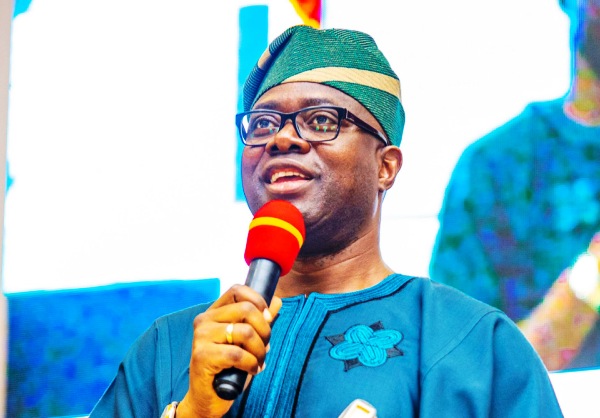
Some fresh facts have started emerging why Governor Seyi Makinde of Oyo State rejected the candidate selected by the body of Oyomesi,(Kingmakers) in Oyo Town, to succeed the departed Alaafin of Oyo, Oba Lamidi Atanda Adeyemi 11.
The late monarch died on April 22, 2022 and since then, over nineteen months, a successor is yet to be announced.
No less than sixty-five princess from the Agunloye Ruling House, including an octogenarian priest, Bishop Ayo Ladigbolu, did put in an application to succeed the late flamboyant monarch. But after a laborious exercise, that lasted about four months, the Oyomesi claimed that they have submitted a name to the Executive Governor since 30 September, 2022.
The Governor on his part neither confirmed nor denied being in possession of a recommended name from the Oyomesi. But he just kept mute and refused to announced a name.
The body of Oyomesi however, speculatively approached the State High Court, sitting in oyo town, when they suspected that the Governor might announced a different candidate from their preferred choice. The case is still pending before the State Chief Judge who is yet to assign it to a trial Judge.
But in a new twists, www.focusmagazineonline.com gathered in the ancient town of Oyo that the Governor ‘might be protecting the ancient stool from despoliation by his tardiness in announcing a substantive Alaafin’.
Since 1823, Sokoto Caliphate has had a near obsession to annex Oyo into its estate, using the proxy emirate at Ilorin.
A source revealed to www.focusmagazineonline.com that there are a lot of external influences circling around the Oyomesi trying to influence the selection process.
It was further revealed that a prince with very deep affiliation to the Caliphate through Ilorin, and had gotten the support of the Sultan of Sokoto had successfully infiltrated the Oyomesi to influence the successor of Adeyemi III.
The prince was said to have the confidence of the Chief Imam of Oyo Town and that of the Muslims’ Rights Council (MURIC), in his bid to ascend the throne.
‘These people put immense pressure on the Bashorun to compromise the selection process, so that he can recommend the selection of a prince with Fulani blood’.
‘This prince’, www.focusmagazineonline.com further gathered, ‘has more loyalty to Usman Dan Fodio philosophy and heritage than the Yoruba heritage’.
Governor Makinde was said to have seen through the shenanigans and decided to outrightly cancelled the selection process and ordered a fresh one, which the Oyomesi strongly objected to.
The source revealed that ‘Governor Seyi Makinde rejected the process at the risk of his second term in office and insisted on a new selection process with total autonomy of the Oyomesi from Sokoto/Ilorin Fulani caliphate’s influence’.
Main Story
EFCC Arraigns 11 OAU Undergraduates for Alleged Internet Fraud
Published
1 year agoon
November 8, 2023By
FocusMag
Eleven of the sixty-nine students of the Obafemi Awolowo University (OAU), Ile-Ife, Osun State, arrested by the operatives of the Ibadan Zonal Command of the Economic and Financial Crimes Commission (EFCC) on Wednesday (31 October) over alleged fraudulent internet activities have been charged to court.
The remaining fifty-eight arrested students have since been released.
The students were arraigned before Justice Nathaniel Ayo-Emmanuel of the Federal High Court, Osogbo for their alleged involvement in internet fraud.
www.focusmagazineonline.com recalled that about 69 students of the institution were arrested over alleged fraudulent internet activities at the end of the operation. The operation reportedly lasted between about 1.40 a.m. and 4 a.m. on Wednesday. The suspects were ferried to the EFCC zonal office in Ibadan, the Oyo State capital for interrogations.
This was disclosed in a statement by the Head of Media and Publicity of the EFCC, Dele Oyewale, on Tuesday (07 November).
Oyewale said the defendants were arraigned on different count charges, ranging from one to six charges, as preferred against them by the EFCC.
The defendants are: Perekebena Olombeni Micah, Nnekwelugo Nnaemeka, Moyosore Favour Oluwasakin, Aghwaritoma Wisdom Obaro, Daniel Olashile Maiye, Gbolahan Khalid Adesina, Yinka Temitope Jayeola, Olumuyiwa Emmanuel Adeleye, Abiola Emmanuel Oluwadare, Busari Abdulazeez Ayodeji and Okesipe Tobiloba Paul.
Nine of the defendants were arraigned on one-count charge each, while the remaining two: Micah and Obaro, had six-count charges filed against each of them.
One of the counts reads: “That you, Perekebena Olombeni Micah sometimes in 2023 in Osogbo, Osun State within the jurisdiction of this Honourable Court did fraudulently impersonated the name – Pies through your Whatsapp account phone number +1(414)367-9473 by claiming that you are an American Female in love with your victims in the United States of America with intent to gain advantage for yourself and thereby committed an offence contrary to Section 22 (2) (b) (i) and punishable under Section 22 (2) (b) of the Cyber Crimes (Prohibition, Prevention etc.) Act, 2015.”
Another count reads: “That you, Aghwaritoma Wisdom Obaro on or about 1st November, 2023 at Ile-Ife, Osun State, within the jurisdiction of this Honourable Court, fraudulently impersonated by representing yourself to be a white man by name Alex Stephens from United States of America to one Megan Johnson, through your Google Chat and your email address (alexsteps678@gmail.com) with intent to gain advantage for yourself and thereby committed an offence contrary to Section 22 (2) (b) (i) and punishable under Section 22 (2) (b) of the Cyber Crimes (Prohibition, Prevention etc.) Act, 2015.”
Upon their arraignments, they all pleaded “not guilty” to the charges when they were read to them.
Consequently, prosecution counsel, Oluwatoyin Owodunni, prayed the court for trial dates and the remand of the defendants in a Correctional Centre.
In response, defence counsels to Ayodeji, Adesina, Oluwasakin, Micah, Adeleye and Okesipe informed the court of “motions for bail applications” filed on behalf of their clients, which have been served on the prosecution, therefore urging the court to admit the six defendants to bail in the most liberal terms.
Justice Ayo-Emmanuel, having listened to the prayers of both parties, admitted Ayodeji, Adesina, Oluwasakin, Micah, Adeleye and Okesipe to bail.
Ayodeji, Adesina, Oluwasakin, Adeleye and Okesipe were admitted to bail in the sum of N2 million each, while Micah was granted bail in the sum of N3 million.
Other bail conditions are: two sureties in like sum, first surety must be the defendant’s father or mother; the second surety must be a relative, sibling, clergy or civil servant with the Osun State Government; the sureties must depose to an affidavit of means and both residential and office addresses of the sureties, as well as their statuses, must be provided and verified by the court registrar.
The judge adjourned the matters to November 29 and December 12, 2023 respectively for commencement of trial and remanded the defendants at the Ilesha Correctional Centre, Osun State pending the perfection of their bail conditions.
The defendants were among the 69 suspected internet fraudsters arrested on November 1, 2023 at Oduduwa Estate area of Ile-Ife in Osun State following actionable intelligence on their alleged involvement in fraudulent internet-related activities.
Main Story
Nigerians Says No as Labour Declare Strike
Published
1 year agoon
November 8, 2023By
FocusMag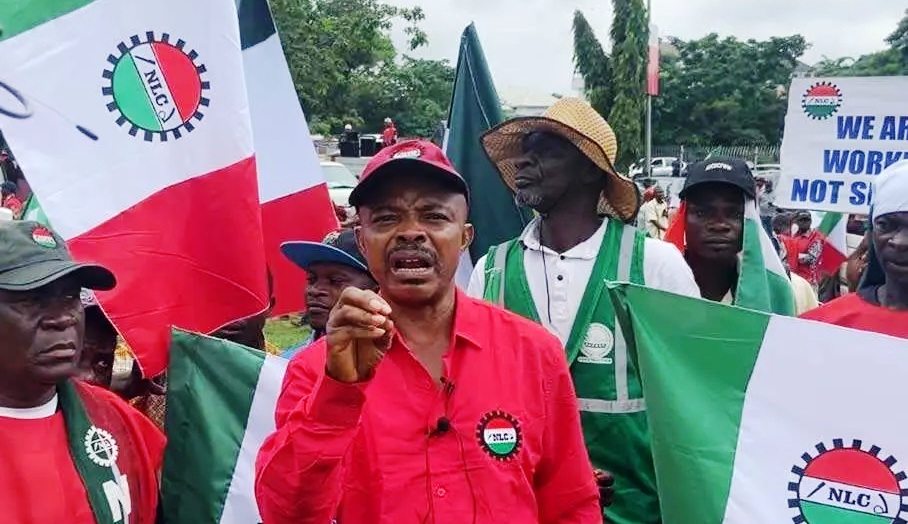
Organised Labour, consisting of the leadership of the Nigeria Labour Congress (NLC) and the Trade Union Congress, (TUC), have been advised to shelve their proposed nationwide strike slated to take off on November 14.
Many Nigerians spoken to were particularly displeased that the workers could be contemplating such an economic debilitating move at this point in time, when the nation is grasping for breath economically.
www.focusmagazineonline.com recalled that the leadership of the two unions on Tuesday (07 November) declared a total nationwide strike effective November 14, 2023.
The leadership of the two unions reached the resolution after an extraordinary National Executive Council meeting on Tuesday in Abuja.
The leadership of the NLC and the TUC had summoned what the unions described as an extraordinary NEC meeting.
The aim of the meeting was to review the modalities of the planned strike following the brutalisation of the National President of the NLC, Joe Ajaero, review of the Memorandum of Understanding signed between the Federal Government and the organised labour on October 2, 2023, following the removal of the subsidy on Premium Motor Spirit which the labour centres said has caused “untold hardship” to Nigerians.
The labour unions had, on Friday, issued a five-day ultimatum over the earlier arrest of the National President of the NLC, by the police in Owerri, Imo State, on Wednesday.
The labour centres demanded the redeployment of the commissioner of police in the state and the arrest and prosecution of the aide of the government who was alleged to have perpetrated the attack.
The unions also threatened to embark on a nationwide industrial action if their demands were not met in five days from Friday.
But a Labour Lawyer, Mr. Richard Akinola counselled the unions to perish the plan, at least for now.
He wrote, ‘dear NLC, l was one person that came out unapologetically to condemn the brutalization of your president, Joe Ajaero in Imo state and l still stand by that condemnation.
‘However, by declaring a national strike over that assault is stretching your luck too far. You have trivialized strike as a tool that nobody takes you serious again. You have demystified yourself and the potency of strike. So, you mean workers in Maiduguri would go on strike because of what happened in imo?
He added that ‘you people mean employers who have no trade dispute with their workers would shut down in this struggling economy and you expect them to pay the workers? When you abuse the power of strike, it loses its potency. You guys must be joking’, he warned the workers.
An Ikeja based businessman, Engr. Charles Nwaneke was more furious. He lamented the huge wage bills he had to contends with every month, and now the workers are planning to disrupt what was left of his staggering business.
He urged the workers to always towed a path of peace and development.
www.focusmagazineonline.com recalled that NLC President, Ajaero was arrested by the police ahead of the state-wide protest in Imo on Wednesday. This was disclosed by the NLC’s Head of Information, Benson Upah.
Although the police denied arresting Ajaero, stating that he was merely taken into protective custody to prevent a mob attack, the Imo State Governor, Hope Uzodimma, accused the labour leader of meddling in the political affairs of the state.
The attack on the labour leader has been condemned by many prominent Nigerians and civil society organisations, including the presidential candidate of the Labour Party in the 2023 elections, Peter Obi, and human rights lawyer, Femi Falana (SAN).
Trending
-
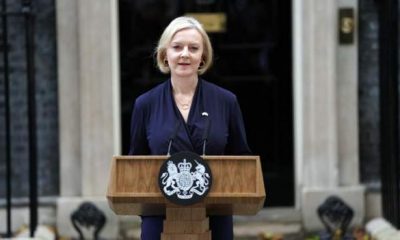
 Main Story2 years ago
Main Story2 years agoBREAKING: Liz Truss resigns as UK prime minister
-

 News3 years ago
News3 years agoSports: Messi misses out on Ballon d’or, Oshoala, Adeyemi in female, junior lists.
-
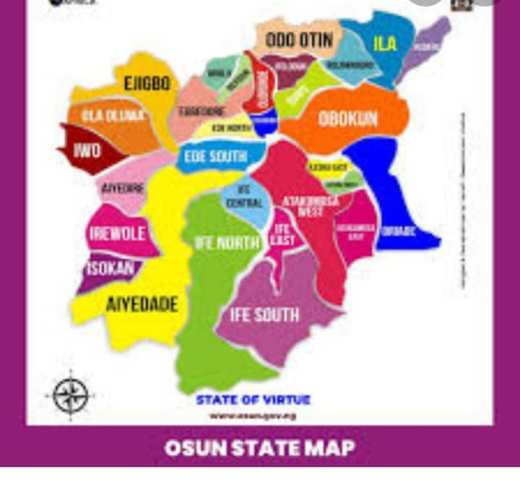
 Featured3 years ago
Featured3 years agoPolitics of Forced Congratulatory Messages Over Osun Guber Election
-

 Business2 years ago
Business2 years agoCurrency Redesign: Emefiele Unperturbed As Nigerians Groan in Pains
-
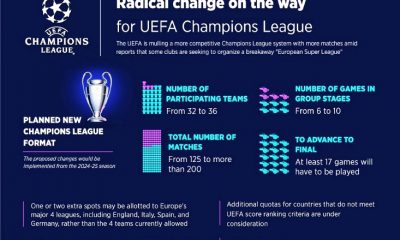
 Sports1 year ago
Sports1 year agoUCL format to change for 24/25 season: groups, knockout, league table
-
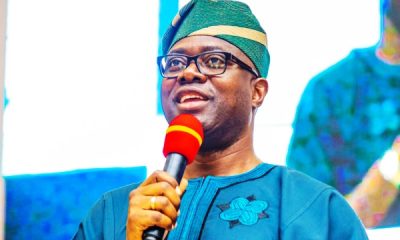
 Main Story1 year ago
Main Story1 year agoReal Reasons Makinde Refuses To Announce New Alaafin
-

 News2 years ago
News2 years agoBREAKING: Phyna is BBNaija season 7 winners
-

 Economy2 years ago
Economy2 years agoCBN’s Change of Naira Shocks Nigerians, EFCC Hail Moves Clampdown on Currency Hoarders
